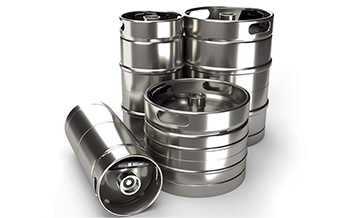When faced with increasing competition, rising supply costs and other common industry challenges, it is not uncommon for brewers and distillers to struggle to correctly identify the most profitable way to ensure the future of their business.
And no, the answer is probably not a new product launch! The surprising twist here is that your operations themselves can often provide the best answers through the data that they’re already producing.
Here is a simple, five-step plan for identifying, collecting, connecting, and transforming the data created through the manufacturing process into actionable insights, ultimately using it to predict your own profitable future.
Identify
Imagine you are standing out on the floor, or even in the receiving dock, and take a good look around – starting at the very beginning of your manufacturing process.
From the moment that supplies are received, your operations are creating data. Someone is recording something – or at least they should be.
Now, identify each point of the process that needs a data point to be considered correct and complete, even if it is a non-numerical record, listing them out in sequence.
In case you’re wondering, each and every piece of information you can collect is valuable. The more data that is tracked, the deeper the insights you’ll be able to develop will be.
Collect
As you go along with your audit of data points, you’ll notice a wide variety of information that can be collected, such as weights, temperatures, composition, yields, etc.
In addition to the data itself, you’ll want to note where it is being stored and in what form. Is there a specific software, spreadsheet, or even paper record “repository” dedicated to housing the information for that step of the process?
Next, compile all of this into a comprehensive list, and provide an example of each data point, remembering to note the unit of measurement, guidelines for acceptable results, or any such relevant context, such as key performance indicators.
Connect
Once you have your data points collected, it’s time to look at where they should be connected. As you think through the connections, the perfect picture of the data’s journey throughout your brewing or distilling process will start to emerge.
In some instances, you probably already have a process in place for sharing data with any relevant operations and team members. Draw this flow out, even if it’s just on a piece of paper.
If you’re lucky, you may also see opportunities to improve communication; that’s just one of the many benefits of going through the steps in this exercise.
Transform
Now, it’s time to make your data work for you. Organising data into rows and columns is helpful, but the real power comes in proper visual representation; this is where data dashboards and, if you really want to do it right, a manufacturing execution system (MES) is the ultimate way to make it actionable.
A MES creates the communication and insights layer between your business systems, such as enterprise resource planning (ERP) and quality lab information management system (LIMS) your processes, including those controlled by PLCs, SCADA, and other instruments, and the data points they create.
When done correctly, it will help you identify the source of waste, product inconsistencies, and help meet and prove to your consumers your interest as a sustainable producer.
Predict
A Pricewaterhouse Coopers survey of 1,000 business executives found that data-driven organisations were three times as likely to achieve major improvements in their decision-making capabilities.
Once all the data is together, you can identify leading and trailing indicators of success faster by finding the ‘root cause’ of inefficiencies – and that’s when you’ll reach the highest standards for quality without sacrificing costs.
You’ll quickly start to realise the operational, and ultimately financial, gains that are a natural result of being a data-driven manufacturer.
Orbis MES
The exercise outlined above may seem like a lot of work, and there’s no denying that it will take a bit of time to evolve to this modern, best-in-class way of doing things. However, we all know that history does not favour those who fail to evolve.
To be successful, you need to make a great batch every time. By adopting a data-driven approach to your brewing or distilling process, you’ll waste less, make more, and be known far and wide.
However, without the proper tools, operation supervisors can still spend 25% of their day manually aggregating, organising, reviewing and reporting data, despite their best efforts to streamline this process.
That’s why, over 20 years ago, the Ireland-based company created Orbis MES. With this system, food and beverage manufacturers like you are using the data in their existing systems to identify ways to reduce waste, improve output, meet sustainability goals, and more.
Orbis MES can help you address your most pressing issues – allowing your operations to make more and waste less each and every day. You can also evaluate operating performance, trace product flows and monitor utilities consumption.
Orbis has extensive experience in the beverage industry, and it is uniquely capable of providing both operational and performance analytics for brewers and distillers. By tracking product flow from grain to bottle, output increases, quality remains consistent, and energy losses are minimised.
In the brewing and distilling space, Orbis partners with Carlsberg, Guinness, Baileys, Captain Morgan Distillery, Johnnie Walker Distillery, Jameson, Mondelez and The McCallan Distillery in Scotland. (www.OrbisMES.com)














